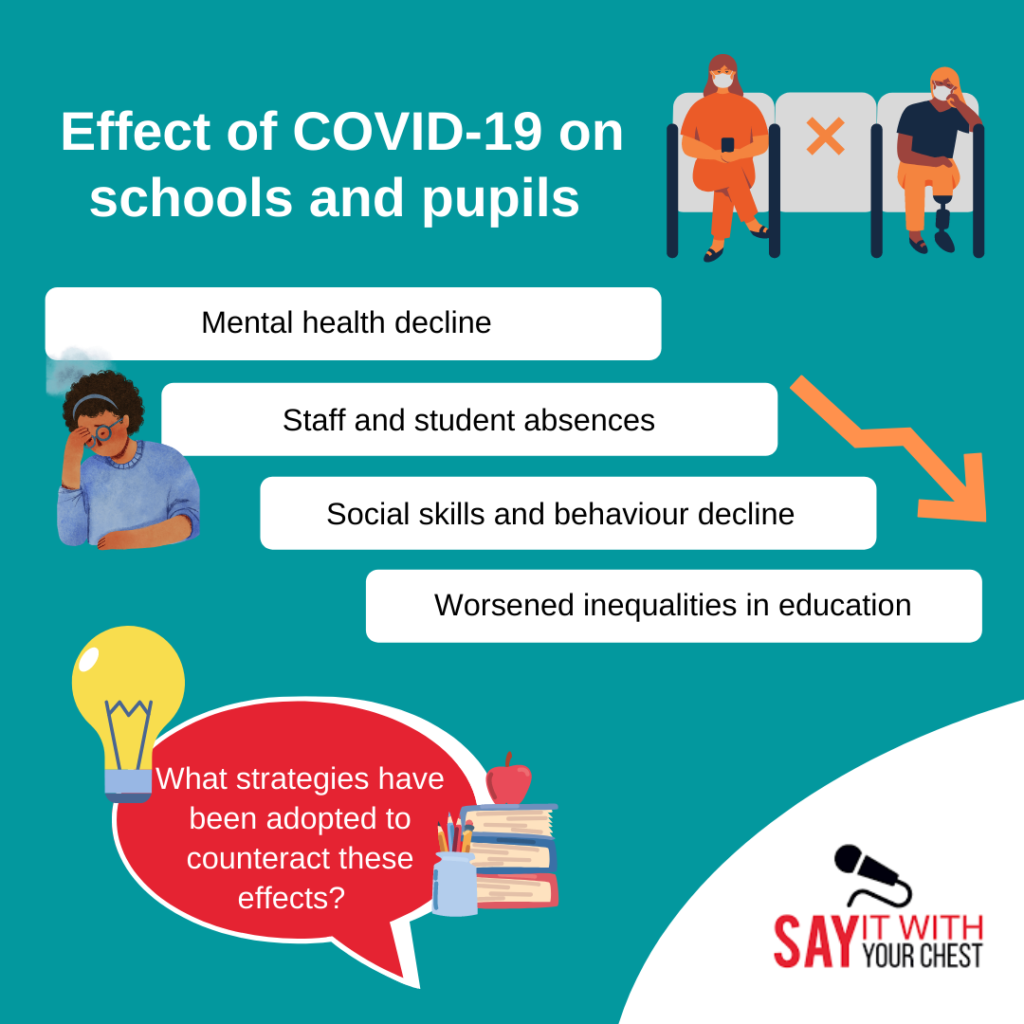
The UK government’s educator regulator, Ofsted, has released a catch-up report [1] following up on the decline in young people’s development. This report looked at the disruption caused by the Covid-19 pandemic. Ofsted’s leading cause of concern is pupils’ mental health problems, stress among teachers, and ongoing school absences due to Covid-19. However, the report stated that schools show ‘encouraging’ signs to improve pupils’ learning and wellbeing. But what are the major issues pupils face, and are schools and the government doing enough to recover the lost time for these young people?

The report
280 school inspections and focus groups took place with early years settings, secondary schools, further education institutions, and prison education providers. The focus groups aimed to see the effect of the pandemic [1].
Inspectors deemed schools were implementing ‘effective’ strategies to check pupils’ progress in their learning and adapting the curriculum to fill in the pupils’ gaps in knowledge and skills. To better understand the UK curriculum, read our blog on the structure of school curriculums.
The Ofsted Chief Inspector, Amanda Spielman, stated that:
“We have seen lots of really good work across early years, schools and further education this term. Most providers are using effective catch-up strategies to spot gaps in children and learners’ knowledge and skills and help get them back to where they need to be. In many cases, those gaps have closed altogether. And we’ve also seen promising improvements in children’s well-being and behaviour. But elsewhere, concerns remain, and it’s clear that the pandemic has created some lingering challenges.”
Amanda Spielman, Ofsted Chief Inspector
Some of the challenges and strategies that schools are implementing and tackling are discussed below from the perspective of Ofsted. But it is important to note that a school inspector’s narrative may not reflect pupils’ and teachers’ experiences.
Pupils’ learning time
Some schools were reported to use assessments to identify what pupils have remembered and then set aside allocated time to revisit concepts that had not been learnt well remotely. Many students and teachers have emphasised the importance of face-to-face teaching and how interaction and discussions in person impact learning, which is greatly impaired in remote online teaching.
In prisons, pandemic-related restrictions have reduced the number of prisoners who can participate in in-person learning. This has forced prison managers to prioritise which prisoners they can offer these lessons to. In many cases, prison management prioritised those who have engaged well with remote education rather than prisoners with the highest need for support and learning. Many of these disregarded prisoners will be those who have special educational needs/disabilities (SEND).
Access to education
Inequalities to access to education have been worsened by the pandemic, as seen in prisons. For example, many pupils at schools with additional needs or who have a learning style not accommodated by remote learning have been disadvantaged. Many teachers, especially in non-selective schools with minimal funding, are not provided with the tools to help these students learn. This can worsen the gap in inequality in education. To read more on the factors that have been further impaired by the pandemic that affects education access, read our previous blog here.
Pupil behaviour
Many studies have shown that lighting, seating, and colour can affect learning ability. One study found that classroom design can have up to 25% difference (positive or negative) on students’ progress throughout the academic year [2]. Being in a non-learning environment like a pupil’s house can affect concentration. Remote learning cannot replace a classroom environment, where schools strive to create classrooms that stimulate pupils.
Absences
Staff absence due to COVID-19 was a challenge for schools. The difficulties in recruiting supply teachers caused increased staff workloads, as schools were forced to use their staff to cover lessons. Around 5% of teachers and school leaders were estimated to be absent in January due to COVID-related reasons [3]. As a result, the recruitment and retention of teachers and staff were challenging for many schools. In some cases, this has impacted the quality of education.
21.3% of pupils in the 2020/21 academic year were recorded as not attending lessons due to Covid-19 [4]. This included pupils’ having to self-isolate, being ill or having to shield for others in their household. In pupil referral units, the number of pupils who were recorded as not attending due to Covid-19 in 2020/2021 reached 12.7% [4]. Therefore, the absences of teachers and students have caused a major halt in learning.
Mental Health
The pandemic’s impact on some pupils’ mental health and well-being remained an ongoing concern for schools and Ofsted. In a previous blog, we saw that young people’s mental health during the beginning of the pandemic was noted by the Department of Education and mental health charity, YoungMinds.
As mental health concerns remain high, new pupils’ who had enrolled to a new school were experiencing higher levels of exam anxiety [6]. These pupils are mainly those who have recently moved onto a secondary school from a primary school. In addition, 67% of survey responses from 13-25-year-olds said that the pandemic will negatively affect their mental health [5].
So, what’s next?
Schools White Paper
In March of 2022, the UK government has pledged that by 2030, all children will ‘benefit from being taught in a school in, or in the process of joining, a strong multi-academy trust, which will help transform underperforming schools and deliver the best possible outcomes.’ Other plans in the White Paper focus on 500,000 teacher training opportunities by 2024, increasing the starting salary to £30,000 to retain teachers, and giving every school access to funded training for a senior mental health lead [7].
Education Secretary Nadhim Zahawi has said this about the plans in the Schools White Paper:
“This is levelling up in action. The Opportunity for All White Paper will deliver for every child, parent and family, living anywhere from rural villages, to coastal towns through to the largest cities, by making sure all children have access to a school that meets our current best standards, harnessing the incredible energy and expertise of the one million people that work in schools. Any child who falls behind in maths or English will get the support they need to get back on track.”
Nadhim Zahawi, Education Secretary
Catch up strategies
Ofsted has reported that many schools have adopted catch-up strategies for their students [1]. In addition, schools are adapting their curriculum by teaching what has been missed, providing opportunities to revise, focusing on core subjects, providing interventions to support catch-up for targeted pupils, and investing in additional resources to support catch-up [6].
There have also been ‘education recovery’ strategies to help increase and retain the teacher workforce [6]. This includes recruiting staff with strong vocational skills and qualifications in English and mathematics. Another approach some schools have started is to bring in programmes to address soft skills and work behaviours, including external mentoring programmes.
Do you work with young people that could benefit from additional and personalised support? Say It With Your Chest can help your young people tackle issues that have been building up during the pandemic through our Personal Development Workshop. If you would like to find out more, please follow the link below!
References
[2] https://www.sciencedirect.com/science/article/pii/S0360132315000700
[6] https://www.gov.uk/government/news/strong-signs-of-recovery-across-education-but-challenges-remain
[7]. https://www.gov.uk/government/news/schools-white-paper-delivers-real-action-to-level-up-education